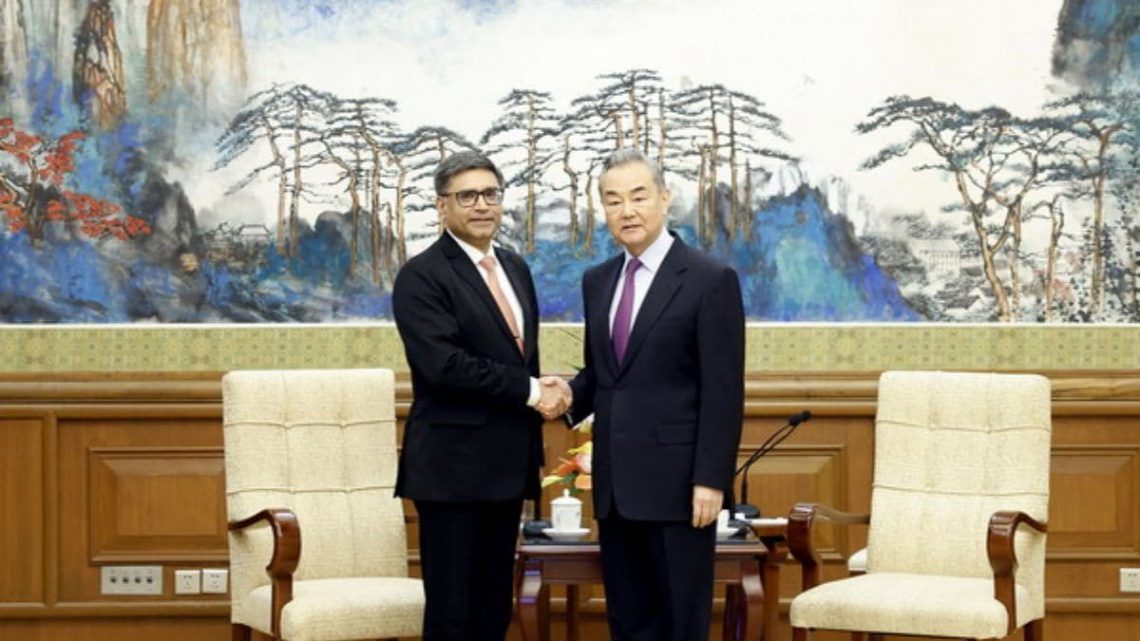Foreign Secretary Vikram Misri on Monday met Chinese Foreign Minister Wang Yi during his ongoing visit to China.
Misri arrived in Beijing on Sunday and met Liu Jianchao, the head of the Communist Party of China’s (CPC) Central Committee’s international affairs department. He was scheduled to meet Vice Foreign Minister Sun Weidong on Monday.
Misri’s visit and meeting with Wang comes at a time when India and China are working to rebuild the relationship after reaching an understanding regarding the border standoff in Ladakh last year. In recent months, in addition to Prime Minister Narendra Modi and Chinese leader Xi Jinping, the foreign ministers and defence ministers of both the sides have also held meetings.
In a statement regarding the meeting, the Chinese Ministry of Foreign Affairs (MoFA) said that India and China “should seize the opportunity, work together in the same direction, explore more substantive measures, and strive for mutual understanding, mutual support, and mutual achievement, instead of mutual suspicion, mutual alienation, and mutual consumption”.
India and China have completely different perceptions of the bilateral relationship. While India maintains that peace and tranquility at the border is the basis of the broader bilateral relationship, China maintains that the question of the border is separate from the broader bilateral relationship and crises at the border should not affect the broader bilateral relationship.
The MoFA further said, “The improvement and development of China-India relations is fully in line with the fundamental interests of the two countries and the two peoples, is conducive to safeguarding the legitimate rights and interests of countries in the Global South, and is conducive to making contributions to peace, stability, development and prosperity in Asia and the world.”
On his part, the MoFA quoted Misri as saying that in line with the understanding outlined by Modi and Xi in their meeting in Russia on the sidelines of the Brics Summit last year, India and China have carried out a “series of useful dialogues and communication, properly managed and resolved differences, and promoted the resumption of practical cooperation in various fields”.
The MoFA further quoted Misri as saying that “India is ready to celebrate the 75th anniversary of the establishment of diplomatic relations with China and will fully support China’s work as the chair of the SCO”.
In October 2024, India and China reached an understanding regarding the stand-off in eastern Ladakh. Even as the stand-off in the region is yet to be fully resolved, the understanding led to a meeting between Modi and Xi and was seen as a thaw in the frozen India-China ties.
In 2020, Chinese aggression in Ladakh triggered the yearslong, ongoing standoff that plunged India-China ties to its lowest since 1962 when the two countries fought a war. In October, the two sides agreed to India’s resumption of patrolling in Demchok and Depsang in eastern Ladakh and the resumption of China’s patrolling in India-controlled Yangtse in Arunachal Pradesh’s Tawang.
However, the agreement did not address the question of Pangong Tso, Galwan Valley, Patrolling Points 15 and 17A in Gogra Hot Springs area where patrolling remains halted after disengagement was reached in 2022: The buffer zones created in these areas continue to remain in place. Moreover, as many as 50-60,000 troops along with war-waging equipment continue to be deployed in the region and no withdrawal has yet taken place.
Link to article –
Vikram Misri meets China’s foreign minister Wang Yi amid thaw in bilateral ties

